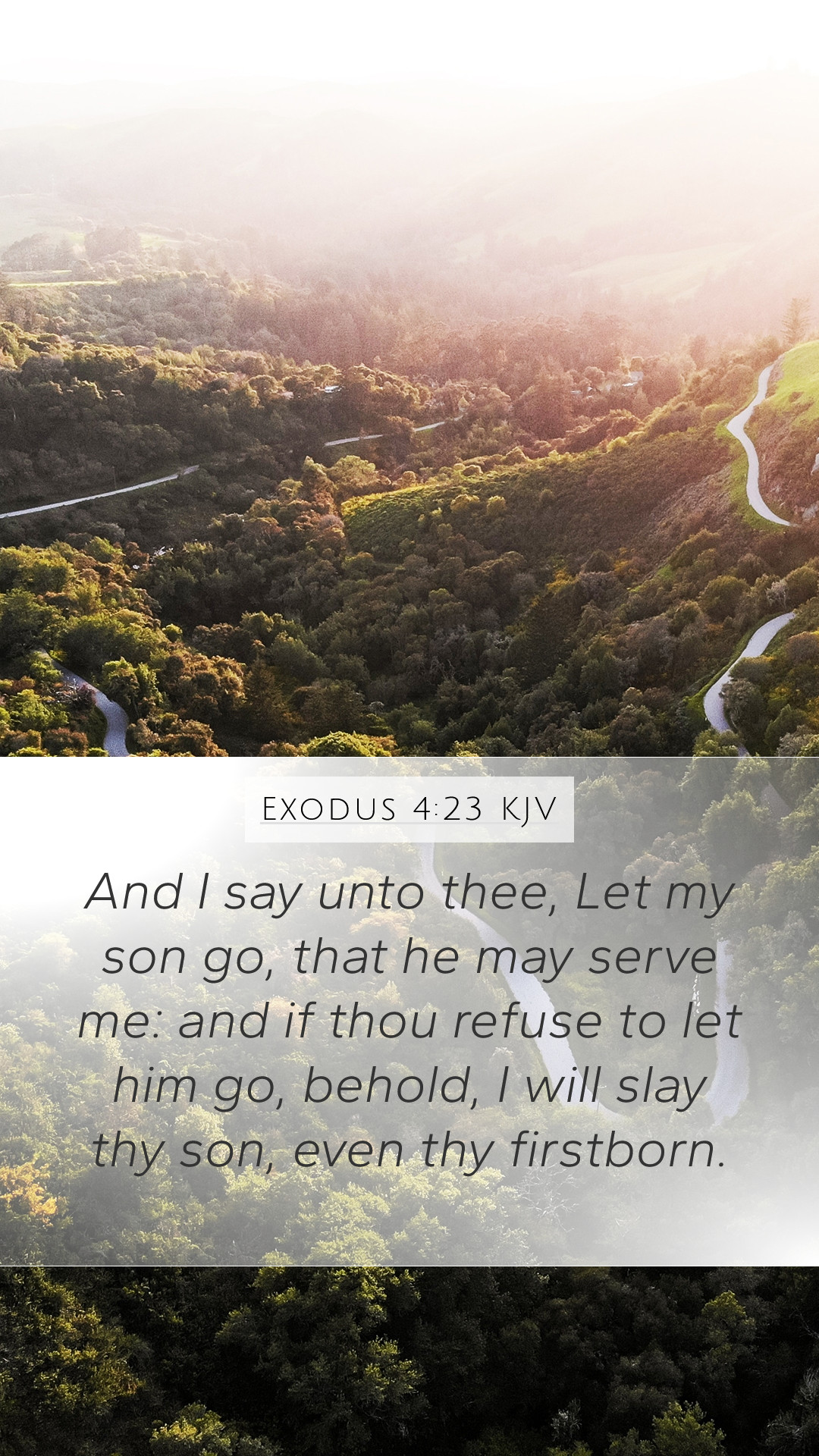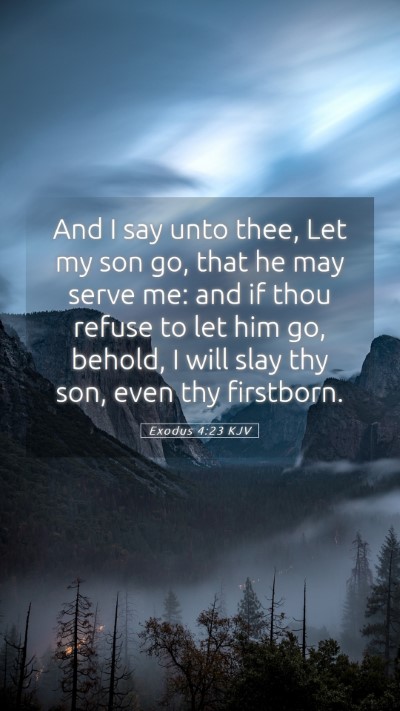Exodus 4:23 - Meaning and Explanation
Bible Verse: Exodus 4:23
In this pivotal scripture, God commands Moses to say to Pharaoh, “Let my son go, that he may serve me.” This verse encapsulates the profound significance of Israel as God’s chosen people and the central theme of liberation in the Exodus narrative.
Contextual Background
Historical Setting: The context of Exodus revolves around the Israelites' suffering in Egypt and God’s plan to redeem His people through Moses. This setting is key for understanding the weight of this verse.
Bible Verse Interpretations
Matthew Henry's Commentary
According to Matthew Henry, this verse highlights the affectionate relationship between God and Israel, depicted metaphorically as His "son." The call for liberation is not merely for physical release but also for spiritual service to God. Henry emphasizes that Pharaoh’s refusal to heed this command leads to dire consequences, showcasing God’s authority over nations and kings.
Albert Barnes' Commentary
Albert Barnes focuses on the implications of calling Israel “My son.” He explains that this designation reflects Israel’s unique status as God’s elect, which should compel Pharaoh to recognize the seriousness of the admonition. Barnes also notes the use of "serve" in the verse, interpreting it as an indication of worship, suggesting that their freedom is for the purpose of fulfilling God’s will.
Adam Clarke's Commentary
Adam Clarke contributes by discussing the covenant relationship between God and Israel. He points out that God’s demand for Pharaoh to let His “son” go to serve Him aligns with the deeper theological principle of worship. Clarke elaborates on the notion that God’s interventions in human history are to bring humanity to a place of recognizing His sovereignty and engaging in service that glorifies Him.
Key Themes and Insights
- Divine Sonship: The term “son” signifies a close bond and the chosen status of the Israelites.
- Purpose of Liberation: The call for freedom is not solely for escape but also for the purpose of serving the Lord.
- Pharaoh's Resistance: The underlying theme of the spiritual battle between God's wishes and Pharaoh's hard heart is crucial.
- Covenant Theology: This verse is rooted in the concept of God’s covenant with Israel, emphasizing the obligations of both parties.
- Theological Implications: The verse suggests a broader narrative about the nature of God’s relationship with His people, tying into future messianic themes.
Additional Cross References
- Exodus 3:10 - The calling of Moses to lead the Israelites out of oppression.
- Hosea 11:1 - A prophetic reflection on Israel’s status as God’s son.
- Romans 8:14-17 - The New Testament exploration of believers as children of God.
- John 1:12 - The theme of divine adoption into God’s family.
- Isaiah 43:1 - God’s declaration of His people’s value and His redemptive purposes.
Application for Today
Understanding Exodus 4:23 invites readers to reflect on their own relationship with God. Just as Israel was called to serve God after being released from bondage, individuals today are encouraged to consider how freedom—be it spiritual, emotional, or physical—can lead them to serve God faithfully. This verse prompts personal application in areas of worship, mission, and the commitment to God’s kingdom purposes.
Conclusion
In summary, Exodus 4:23 embodies a theological richness that speaks to God’s character as a loving Father and liberator. The interpretations by Matthew Henry, Albert Barnes, and Adam Clarke enhance our bible verse understanding by revealing the layered meanings present in this scripture. As believers or those studying the Bible, recognizing this relationship offers profound bible study insights and builds a meaningful connection for modern application.
Further Study Resources
- Bible study guides focused on the Exodus narrative.
- Online Bible study platforms for collaborative learning.
- Comprehensive Bible commentaries for deeper theological exploration of themes.
Final Thoughts
Our journey through interpreting Bible verses like Exodus 4:23 deepens our understanding Scripture and enriches our spiritual lives. Engaging with different bible study tools and resources can illuminate the powerful truths found in the Word of God.


